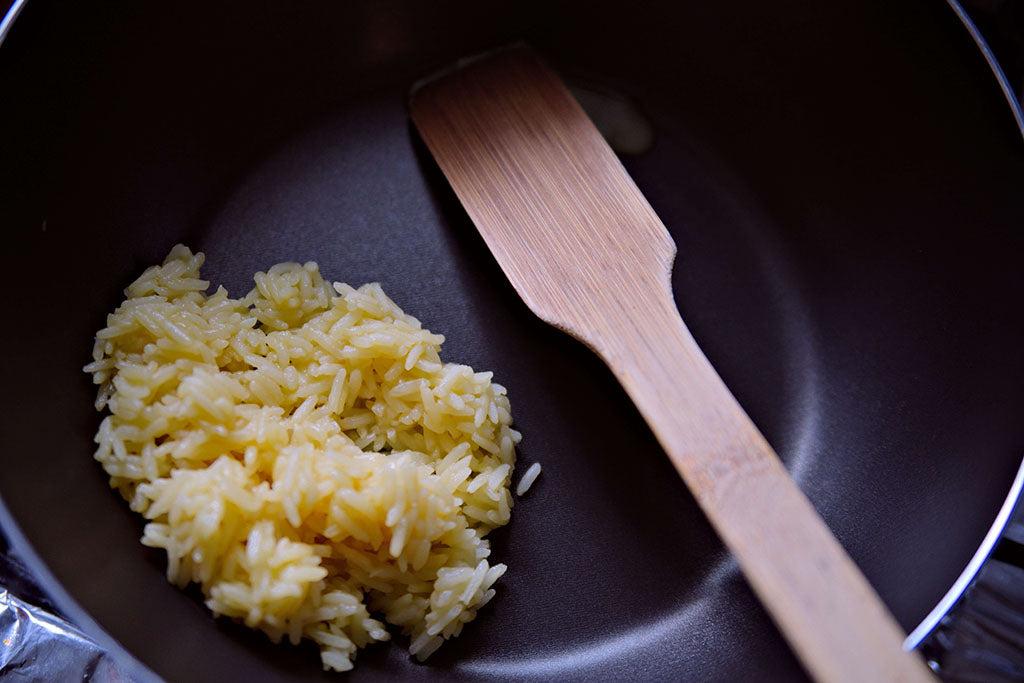Summary: In this blog, we learn all about whether rice is good for a dog, including the white, brown, basmati, and wild varieties, and whether a dog can be given rice every day…
Can Dogs Eat Rice?
In short, yes! Dogs can eat cooked, plain, white rice and this includes basmati, long-grain, and jasmine rice too. Vets sometimes even recommend this style of white rice to dogs experiencing any gastrointestinal upset served with some plain, cooked, lean chicken instead of their normal food whilst recovering.
Rice often appears as an ingredient in commercial dog foods as the carbohydrate source too. However, it is essential that the rice is served cooked and plain to a dog as some fats and seasonings like garlic and onion are toxic to dogs, so a dish like pilau rice is not recommended. Wild rice is also ok for a dog to eat if cooked and unseasoned.
Is Rice Good For Dogs?
Rice is highly nutritious – it just gets a bad wrap because it’s a source of carbohydrates which humans have decided are a bad thing. Carbohydrates are a good source of starch (which is good for the gut), energy and can improve cognitive functioning.
Rice is low in fat and sodium and contains fiber, antioxidants, calcium, vitamins D, B1, and B6, niacin, magnesium, selenium, manganese, and phosphorus. Rice can also help a dog feel fuller for longer.
However, rice can spike sugar levels so dogs who are diabetic may not respond well to white rice and should be given it in very small amounts, with caution and a vet’s go ahead. Dogs that struggle with yeast infections should also be given white rice with caution, as yeast feeds off of the sugars produced by carbohydrates.

Is Brown Rice Good For Dogs?
Brown rice is more nutritious than white rice but can be harder for a dog to digest because it’s so much higher in fiber than white. You shouldn’t give brown rice to a dog that’s experiencing gastrointestinal upset or has a sensitive stomach but brown rice may be helpful to a dog experiencing constipation.
Is Rice Good For Dogs Every Day?
A large dog can be given a ⅓ cup of rice around two to three times a week and smaller dogs much less. Vets may recommend more or less depending on your dog’s gastrointestinal system and health status so do consult with them if you want an exact amount recommended for your dog.
You should always take it slowly when introducing any new food to your dog to avoid upsetting their stomach – particularly with puppies. Feed a very small amount of plain, cooked rice every couple of days over a week before considering continuing to feed low quantities of it to your dog. Some dogs can have a sensitivity to rice too, so signs of a reaction like itchy, dry skin or paws, or vomiting after eating rice are something to look out for over their first few tastes. As with humans, all dogs will react differently to different foods so always be mindful of this when trying them on new foods, snacks, and treats regardless of whether they’re deemed safe.
When cooking rice for your dog, always wash the rice first to remove excess starch and then simply boil it in plain water or use a rice cooker. Remember, seasoned or flavored rice should not be given to a dog and fried rice is also not appropriate for a dog to eat because of potential toxic flavorings or fat.
You may wish to add some veggies like peas or chopped up small pieces of cooked green beans in their rice but rice should only be fed as a little food topper with their regular meals if your dog is of a healthy weight (if they are overweight, they most likely won’t need the extra calories) or given to a dog as a treat, unless otherwise instructed by your vet.
Are Rice Cakes Good For Dogs?
As long as your rice is plain, unflavored, low in sodium, and without preservatives, you can share them with your pooch but, as with every treat, only in moderation.
There are some foods you should absolutely avoid feeding your dog. Find an extensive list below of food known to be toxic to dogs which you should make sure your dog never consumes:

Sources
Author Guthrie, Lynn “Can Dogs Eat Rice? Yes! Here’s The Skinny On This Ancient Grain” Prrs & Wags by Pumpkin, Sep 17. 2021 https://www.pumpkin.care/blog/can-dogs-eat-rice/
Author Anastasio, Alexandra “Can Dogs Eat Rice?” American Kennel Club, Feb 05. 2019 https://www.akc.org/expert-advice/advice/can-dogs-eat-rice/







